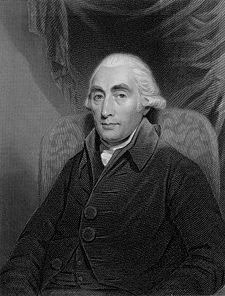1902 Encyclopedia > Joseph Black
Joseph Black
Scottish physician and chemist
(1728-99)
DR JOSEPH BLACK, a celebrated chemist, was born, in 1728, at Bordeaux, where his father—a native of Belfast, but of Scottish descent—was engaged in the wine trade. He was educated from his twelfth to his eighteenth year at a grammar school in Belfast, whence he removed, in 1746, to the university of Glasgow. There he chose medicine as his profession, and devoted himself earnestly to physical science, being encouraged and guided by Dr Cullen, who then lectured on chemistry in Glasgow, and whose liberal and original views were in unison with Black's own aspirations. From assisting in Cullen's chemical experiments he acquired the delicate manipulative skill essential to success in original scientific research.

Joseph Black
In 1751 he went to complete his medical studies at Edinburgh, and after taking his medical degree there in 1754 revealed himself as a great scientific discoverer. At that time the causticity of the alkalies was attributed to their absorbing an imaginary fire-essence known as phlogiston, an hypothesis which Black overthrew by showing that their causticity depended on their combining with a ponderable gas, carbonic acid, which he named fixed air, meaning that it was found not only as a separate fluid, but as fixed in solid bodies. This discovery, made by Black in his twenty-fourth year, was first sketched in a treatise, De Acido e Cibis orto, et de Magnesia, and afterwards embodied in his work, Experiments on Magnesia, Quicklime, and other Alkaline Substances, which Lord Brougham has declared to be "incontestibly the most beautiful example of strict inductive investigation since the Optics of Sir Isaac Newton."
These works revolutionized chemistry. Previous investigators imagined that atmospheric air was the sole permanently aeriform element, a belief to which even Hales, who had shown that solids contain elastic fluids, had adhered. But when Black proved that a gas not identical with atmospheric air was found in alkalies, it was made plain that various dissimilar gases might exist, and pneumatic chemistry was founded.
Although the full value of this discovery was not immediately visible, it added so greatly to Black's reputation that in 1756 he was chosen to succeed Dr Cullen as lecturer on chemistry in Glasgow University. He was also appointed to the chair of anatomy, but, not finding its duties congenial, exchanged it for the professorship of medicine. For some time he was so assiduous in preparing his lectures as to neglect fresh investigations, and even left the examination of carbonic acid, or fixed air, to be afterwards completed by Cavendish. He was highly esteemed as a professor by his students and colleagues, and became, through his attention and urbanity, a very popular physician in Glasgow. From 1759 to 1763 he prosecuted inquiries resulting in his theory of latent heat, which may be thus summarized—A solid liquefies or a fluid vaporizes through heat uniting with the solid or fluid body, and a fluid solidifies or a gas liquefies through the loss of heat; but in no case is this increase or diminution of heat detected by the senses or the thermometer, Black therefore named that heat latent which alters the condition, not the temperature, of a body. He likewise proved that bodies of equal masses require different increments of heat to raise them to the same sensible temperature—a doctrine now known as the law of specific heat.
His theory of latent heat he corroborated by numerous experiments, but he never published a detailed account of it, an omission which enabled others to lay claim to his great discovery. Thus M. Deluc, in 1788, declared himself its author. In 1766 Black was elected to succeed Cullen in the chair of chemistry at Edinburgh University. In this office he bestowed great care on his lectures, striving to give a lucid exposition of ascertained facts rather than to effect new discoveries; and such an interest did he communicate to his subject, that chemistry was for a time, it is said, regarded as a fashionable accomplishment in the Scottish capital.
He was intimate with the great men who adorned Edinburgh society during the second half of the eighteenth century, counting among his friends Watt, Hume, Robertson, Hutton, Adam Smith, and, at a later period, Robison, Playfair, and Dugald Stewart. His constitution had always been feeble, and he was ultimately reduced to the condition of a valetudinarian, which may account for the indifference he manifested during his latter years to original research. He retired from his professorship in 1796, and on the 26th November 1799 passed away so quietly that a cup of water, which he had held in his hand, remained unspilled after he had breathed his last. At the instance of Lavoisier he had been elected a member of the Paris Academy of Sciences.
Black was singularly modest, gentle, and sincere; his philosophic tranquillity was seldom ruffled; and his sagacious diffidence was equally conspicuous in his scientific inquiries and in his social relations. He has been called the founder of modern chemistry. When he began his career that branch of knowledge had only recently been raised to the rank of a true science through the efforts of Hermann Boerhaave, and was in many quarters even regarded with suspicion as being akin to alchemy on the one hand, and to humble trades on the other. But after Black's discoveries its scope and capabilities were immensely extended, and no one could then question its claim to rank with the most important sciences. The only works of his which appeared in print during his lifetime were Experiments on Magnesia, etc, Observations on the more ready Freezing of Water that has been boiled, and Analysis of the Waters of some Boiling Springs in Iceland. [--]
|
